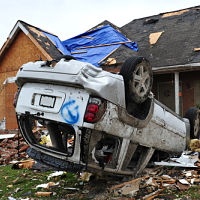
 |
|
 |
Sumter Needs CON Approval Before Rebuild Barbara Rivera Holmes Albany Herald March 28, 2007 ALBANY — Eventually, Sumter Regional Hospital will have to reapply for a certificate-of-need if it plans to continue providing health care services to Southwest Georgians, a state official said. While Sumter Regional wouldn't be reviewed as a new hospital, it would nonetheless be subject to the same CON application process all organizations whose building expenses surpass the $1.7 million threshold are submitted to, said Rob Rozier, executive director of health planning for the state Department of Community Health. “There is no exemption to rebuild something that was destroyed in a tornado, for example,” Rozier said during a phone interview from his Atlanta office. The hospital also would be subject to CON application fees, which are set at 1/100 of the estimated capital costs, Rozier said. If it costs $5 million, he said as an example, then CON fees would be $50,000. Rozier said the fees go toward the administrative costs of running the CON program. To reapply, the hospital has 12 months from the day it last provided inpatient services. Sumter Regional spokesman Marcus Johnson said the hospital has likely not had inpatients since a deadly tornado tore through Sumter County on March 1 and caused at least $100 million in damages to the hospital. It's quite unlikely that the Americus community hospital would be denied its certificate- of-need, Rozier said. David Seagraves, CEO of Sumter Regional, said the hospital has no timetable regarding any CON applications. He said that matter “depends on the answers we get when the building has been completely assessed” by engineers and construction consultants. Otherwise, he said, “we don't know what we would be requesting. We may be requesting approval of monies to renovate” or build an entirely new structure. “It's too early to be acting in that area,” he said late Tuesday afternoon. Seagraves said he hopes to have the structural engineers' analysis by the end of the week. To rebuild or to start from scratch — “That's the million dollar question,” Johnson said. In the meantime, a 50-bed “field hospital” has been set up in the Sumter Regional parking lot. There, medical professionals can provide basic health care and urgent care services, Johnson said. The temporary facility is serving “anywhere from 50-60” people per day, he said. Surgery is not performed there and women in labor who come to Sumter Regional are directed to other area hospitals. Recently, however, a baby was delivered at the field hospital as there was not enough time to transport the woman elsewhere, he said. “What we tell people is that ‘You can come to us and we will do all of the things we can do,' ” Johnson said. “We can keep people overnight for observation, but anything more than one night we are probably” going to send them elsewhere. Prior to the tornado, Sumter Regional's emergency room saw 59 patients a day, according to 2005 fiscal year data, and another 50-75 were labeled as inpatient “at any one time,” Johnson said. |
|
||||||||
| Phoebe Sumter Medical Center, 126 Hwy. 280 West, Americus, GA 31719 (229) 924-6011 | ||||||||||
| ©2026 FastHealth Corporation Terms Privacy | US Patent Numbers 7,720,998 B2, 7,836,207 |